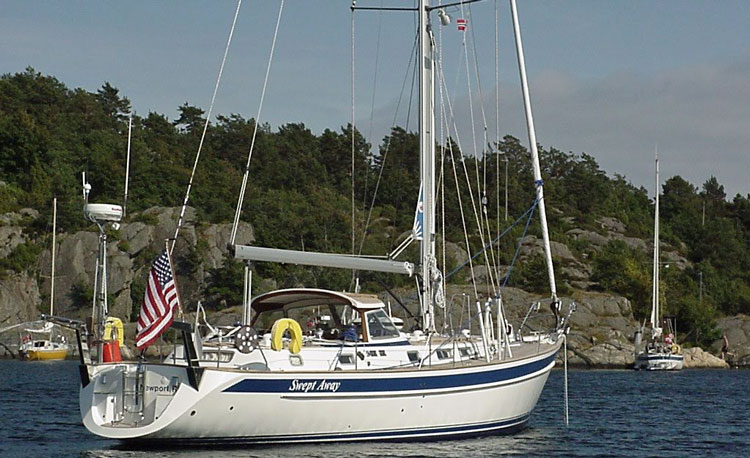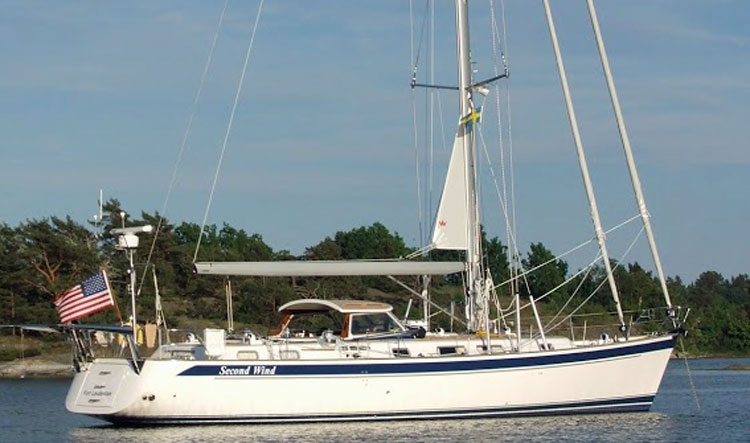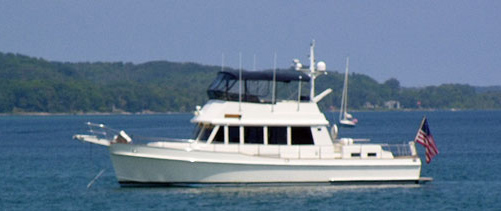 |
 |
 |
Sunday, August 10, 2008, in Arendal, Norway
Hi all. We’re winding down our travels in Norway. Sometime this week we’ll cross back to Sweden. Our plan is to sit for a week at the boatyard where we store for the winter. We’d like to get some work done on the boat’s electronics now, and go back out sailing to test it all out and make sure that everything is fine.
Last Sunday, we were anchored outside of the small resort town called Lillesand. The next morning was drizzly and cloudy, but we only needed a brief window to motor a mile or two into Lillesand’s guest marina. Magically, a space just our size was available. Just as magically, we had enough time to get ourselves docked and put up our protective canvas “house” before the downpour. It rained so long that we stayed onboard for lunch, even though a restaurant-filled resort was steps away.
When the skies finally cleared a bit, we weren't the only ones who’d been hiding under cover. We took our first walk in town, and the streets were filled with vacationers emerging to stroll around and find some ice cream.
Lillesand is the first place on this season’s itinerary that we’d already visited when we first arrived in Scandinavia to pick up Swept Away in 2000. For the rest of this season, we’ll be returning to places we enjoyed in Norway once before. But I remembered very little about Lillesand from the last time I was there.
We recognized the plaza on the main street and very little else. I don’t think that the town changed very much since our last visit, but I now recognize many of the shops to be part of large Norwegian chains. I don’t remember either of the two supermarkets in town, but Art remembered a butcher shop where we'd bought a reindeer roast. It’s now a bank.
Art watched a Vietnamese woman fishing on the dock next to us. She pulled fish up into her bucket, one after another, using shrimp as bait. Each fish would be big enough to fillet. Her fishing equipment consisted of a spool of line that she wrapped around a little plastic cup, and a rod the size of a conductor’s baton. We never fish, and we have about ten times that investment in equipment onboard. Two kids from a nearby boat saw her success and gave it a try nearby. They caught nothing.
Two days is enough time to loll about in Lillesand, and we needed to settle somewhere before the rains continued. Our choice was Arendal, a town we’d liked a lot when we made landfall there from Sweden in the summer of 2000.
The day was cloudy and absolutely still. Our bow sliced through the glassy sea. The gray sky blended into the gray water. We crossed the bow of a red fishing boat that was dragging a net through the water, with expectant seagulls hovering over his stern. His red hull coupled with the cliché of birds made me feel as though I were living inside an oil painting behind the bed in a roadside hotel.
We turned into Arendal’s large entrance. Small powerboats graced each of the harborside homes, tied fore-and-aft against the inevitable wakes, because nearly everyone ignored the five-knot speed limit. One house had a pyramid of lobster traps on its lawn.
Wed been to Arendal twice in 2000, once to clear in with Customs from Sweden, and once to pick up visitors from the US. It was our first Norway experience and for the most part our first cruising experience in Europe. I was looking forward to seeing it again through more experienced eyes.
Apparently since Mandal we were officially in the land of cuteness. Mandal was cute and medium-sized. Lillesand was cute and small. And even Arendal, which is a somewhat big city, is really cute, too.
We docked in a marina along a guest dock, and moved to a better-protected spot later in the day. In between those events, we walked to town and ate lunch at the fish market overlooking the skinny and picturesque main harbor.
Arendal was filled with people, no doubt still vacationers. But we could already tell from the past few days that the summer in Norway was winding down. This would mean that wed have more luck finding dock space. This was small comfort, though, because wed be heading back to Sweden in less than a week. It also probably meant that our days of sandals and sun hats were definitely over. But even this wasn’t too much of a hardship. I’d never expected to face the outdoors without long sleeves and a jacket.
So far, the end of summer meant rain every day. We arrived in Arendal to beat the forecasted afternoon of rain, and then it arrived. We’d been able to take a walk through town to re-acquaint ourselves. If we got stuck aboard in bad weather for a few days, it wouldn’t be a problem.
Our first full day in town was a nearly full day of rain. But touring in new places means doing things we’d never do at home, and in Arendal, on this day, this meant bowling. Yes, there’s a bowling alley in town just near the marina. The last time either of us went bowling, we didn’t know each other yet. And we’ve been married for thirty years.
Bowling has changed a little in the passing decades. For one thing, you don’t have to keep track of your score on little cards anymore. The pin mechanism is smart enough to do that for you. We somehow ended up on a kiddie lane, where the gutters were blocked. So for our first game, we could bowl as if we were playing billiards, caroming the ball from one side of the lane to the other to get just the right angle on the pins. You’d think that would result in a three-number score, but, well, it’s been a long time. For our second game, we had the teenager in charge of the facility remove our training wheels, the gutter blockers. Strangely, our scores improved in the second game, though not by enough to frighten any bowling champions. Art wanted me to be sure to tell you that he beat me. With that, we decided that we’d probably had enough of bowling for the next thirty years.
Art monitored the weather forecast for a window for crossing back to Sweden. Every day but one was the same: cloudy, some rain, the wrong winds. On Saturday, it was sunny, but not a good day for crossing. We took a field trip to the nearby town of Grimstad.
You’d think that a town with such a name would be, well, grim, and there’s a bit of grimness to it. Grimstad boasts, among others, two very famous writers, though not particularly merry ones. For some time during his youth, the playwright Henrik Ibsen served as an apprentice to a pharmacist, presumably developing his antipathy for Victorian morality and hypocrisy that was later to come to light in Ghosts, A Doll’s House, and Hedda Gabler, among other works. Another native son was Knut Hamsun (Garrison Keillor would be very happy that we’ve encountered so many men named “Ka-nute” this season). Hamsun was awarded the 1920 Nobel Prize in Literature. But the Grim part is that he took his medal and sent it to his friend and idol Joseph Goebbels in 1943, and met with Hitler (though he argued later that the meeting was mostly to complain about the treatment of Norwegians by the Reichskommissar.) He was a supporter of the Norwegian politician Vidkun Quisling, who led the German puppet government of Norway. Quisling’s name later became a synonym for traitor and he was later executed for treason. So Hamsun lost a great deal of the popularity he’d once enjoyed as a local author.
But Grimstad also has some fairy-tale Grimm to it, in the whiteness of the wooden houses and the placid waterfront. We came by bus, expecting to find a summer festival in town. In fact, there were two festivals. One honored the writers Hamsun and Ibsen. Its only event we could find in the daytime was a discussion group. I wasn’t sure that I’d want to see Hedda Gabler performed in the original Norwegian, no matter how lovely it would sound.
The other festival was variously translated to us as “the festival of pleasure” or “the festival of enjoyment.” Notwithstanding the redundancy of the concept, it seemed a good idea to celebrate absolutely nothing. In homage to another celebration of nothing, we decided to call the event Festivus.
Festivus didn’t have much going on during the day, so apparently it did a very good job of being a celebration of nothing. A concert would take place during the evening, but we weren’t willing to make the time commitment, and there was some question as to whether we’d be able to get tickets even if we hung around. There was an outdoor food court at the harbor. We had coffee overlooking Ibsen’s childhood home and walked up and down the pedestrian shopping street. The sun was hot and the sky was clear for the first time in several days, and for the last time for several days to come.
There’s an old quarry somewhere outside of town. In a Grimm turn, it’s now used as a theater in the summertime. The Grim part is that the quarry once supplied red granite blocks to Hitler so that he could build a Victory Monument. The monument, of course, was never built. Too bad, Adolf.
On the bus ride, I noticed a tanning salon that covered several storefronts in the small town of Fevik. I imagined that tanning salons were popular in wintertime in Norway, in the cold and dark days and nights. I imagined that I’d visit a tanning salon in Norway and leave my clothes on. “Oh, don’t bother giving me sunscreen. I just want to stare into the light bulb.”
Rainy days meant that we appreciated the fast Internet access offered by the marina, and we were able to watch the opening ceremonies of the Beijing Olympics on television. They were a triumph of staging, even as viewed on a laptop screen. Normally, the absence of summer television doesn’t matter to us much, but we were really glad that we’d been able to watch this event. Though we don’t always mix politics with cruising, I have to note the following comment that Art made, when the athletes from Lebanon arrived.
The athlete who is chosen to bear the country’s flag in front of the team is selected by the nation’s Olympic Committee or by a vote of the team members. It’s considered a great honor, for a person who’s already in the best moment of their life. Some countries always excel in a particular sport. Our hosts, Norway, were present, though their double-digit medal counts usually happen in the Winter Olympics. Australia, Art mentioned, always brought lots of swimming medals back home.
When the camera found the team from Lebanon arriving in the Parade of Nations, the captioning informed us that the flag-bearer was Ziad Richa. Art read the inscription.
“Lebanon,” he said absently. “Shooting. Well, they’re good at that.”
(I feel really bad about repeating that joke. I don’t know how comedians do it. We’ve been to Lebanon and found the people to be welcoming, educated, and hospitable.)
Today is another rainy day. Art is watching the weather and we are watching the Olympics. At this point in the season, we are simply waiting for a window to travel back to Sweden. We think that we won’t be able to leave Arendal until at least Tuesday, and we’re not sure that we’ll be able to cross until Thursday or so. By the time we write to you next Sunday, we expect that we’ll be back at the yard.
Hope you’re having drier days than we are.
Love, Karen (and Art)